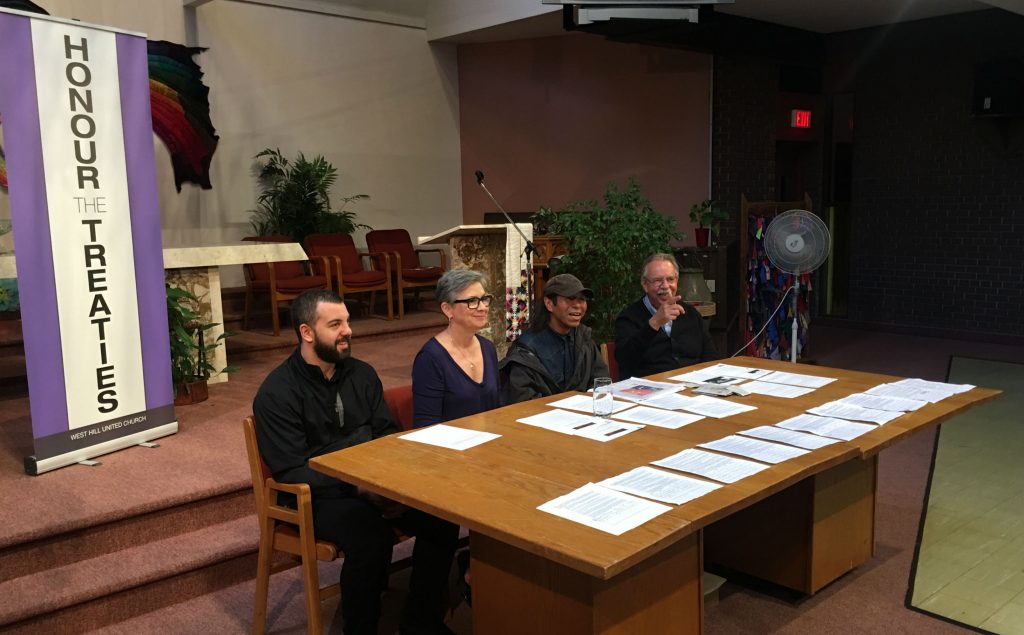New petition calls on the federal government to honour the treaties with Indigenous peoples

Justin Panos of CUPE 3903, Gretta Vosper of West Hill United Church, Gary Wassaykeesic of Mishkeegogamang First Nation, and Steve Watson, Unifor (retired). Photo by Tom Keefer.
SCARBOROUGH – As Canada nears its 150th birthday, not every community in the country has equal cause to celebrate. For that reason, a United Church congregation in Scarborough has launched a petition calling on the government of Canada to honour both the spirit and the letter of the treaty relationship with Indigenous Peoples in Canada. The group also wants the Canadian government to take immediate action to address the inequalities between Indigenous communities and the general population with respect to clean drinking water, education, housing, health and social services, and youth suicide prevention in particular.
According to Gretta Vosper, West Hill United’s Minister, “we are appalled and deeply grieved by the behaviour and political choices of our forebears, notably our first Prime Minister, Sir John. A. Macdonald, who will be much celebrated this coming week. And we lament that, given the Royal Commission on Aboriginal Peoples of 1996 – twenty-one years ago – the Government of Canada’s apology for residential schools – given seven years ago in 2008 – and the receipt of the Calls to Action from the Truth and Reconciliation Commission on Residential Schools in 2015, that we live in a country that remains essentially ignorant of its own history.”
Vosper added, “as we celebrate our 150th anniversary, it is crucial that we commit to understanding all our history. That history included the ragged and bloody legacy we laid upon the indigenous peoples of this land. Their dances and ceremonies will beautify our sesquicentennial festivities, but our governments depend upon the convenient ignorance of our interwoven stories. We refuse to be complicit in that silence and the effect it has on Indigenous peoples.”
The petition was created by West Hill’s First Nations Study Group and is co-sponsored by the Justice and Global Issues Team of the SE Toronto Presbytery of the United Church and CUPE 3903 representing 3,500 Teaching Assistants at York University. Copies of the petition can be downloaded for distribution.
Steve Watson, a member of West Hill’s First Nations Study Group, and a long time activist with the Canadian Auto Workers (now UNIFOR) is one of the initators of the petition. According to Watson, “our petition refers, amongst other things, to the fact that a First Nations Reserve had asked Health Canada for help in addressing a youth suicide pact in the community, only to be refused because it was an “awkward” time for the budget. Two youth did take their own lives not long after that refusal and again this month, another young person in the same community died by suicide. It’s clearly time for the nice talk to stop and serious action to begin.”
On Sunday, June 25th the congregation at West Hill United Church read the last of the ninety-four recommendations made to all levels of government by the Truth and Reconciliation Commission reviewing the Residential Schools legacy in which the United Church of Canada was complicit. The congregation has been reading one of the recommendations in its weekly Sunday gathering since September, 2015.
In a closing event to mark the end of their readings of the recommendations, Gary Wassaykeesic, an Ojibway activist from Mishkeegogamang First Nation, addressed the congregation on the topic of truth and reconciliation.
The concluding portion of West Hill United’s ceremony concerning the Truth and Reconciliation report involved making a Two Row Wampum banner with purple strips of cloth that listed all 94 recommendations.
As the 150th anniversary of Canadian Confederation approaches, organizers hope that their petition will challenge the Government of Canada to take immediate action to address inequities between Indigenous and general population communities with respect to clean drinking water, education, housing, health and social services.
A special emphasis in the petition is youth suicide prevention. Asked for assistance intervening in an Indigenous youth suicide pact last year, Health and Welfare Canada refused citing an “awkward” budget period. In the wake of that decision, three youth in the community have completed suicide. It is this failure to act which has instigated the petition action.
In 2013, the West Hill congregation collected 3000 signatures petitioning the House of Commons. The petition was read by Conservative MP Cornelious Chisu, then representing the Pickering-Scarborough East constituency in which WHUC is located. Few of the situations cited in the 2013 petition have been adequately addressed. Organizers have deliberately chosen to keep the petition in a paper format, rather than on-line, as they hope to engage our friends and neighbours in face-to-face dialogue about the issues the petitions raises. The group encourages all Canadian citizens to print several copies and share it widely to foster these important conversations.










